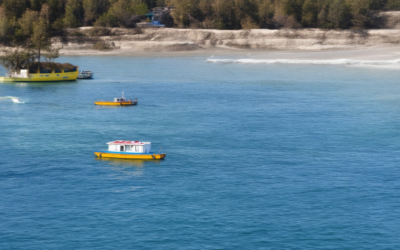Are you considering making a difference in the lives of others by volunteering in Africa? With its rich cultural heritage, breathtaking landscapes, and diverse wildlife, Africa offers a unique opportunity for individuals from around the world to contribute their time and skills towards various causes. From working with endangered species like elephants in sanctuaries to helping children in orphanages, there are numerous opportunities available for those who want to give back to society. In this comprehensive guide, we will explore the ins and outs of volunteering in Africa, covering topics such as the costs involved, safety concerns, and how to find reputable organizations to partner with.

Is Volunteering in Africa Free?
When considering volunteering in Africa, many individuals wonder whether the experience comes with a price tag.
- The cost of volunteering in Africa can vary greatly depending on the organization, location, and type of project.
- Some organizations may charge a fee to cover expenses such as food, accommodation, and program activities.
- However, there are also opportunities to volunteer for free or at a low cost, often through non-profit organizations or community-based initiatives.
Factors Affecting Volunteer Costs
- Organization Type: Non-profit organizations, charities, and community groups may offer free or low-cost volunteering opportunities, whereas commercial companies might charge a fee.
- Project Location: Volunteering in urban areas tends to be more expensive than rural locations, due to higher living costs and logistical requirements.
- Program Activities: Projects involving specialized skills, equipment, or materials may incur additional costs, which are then passed on to participants.
Free or Low-Cost Volunteering Options
- GoAbroad offers a range of affordable volunteering programs in Africa, including teaching, conservation, and community development projects.
- Volunteer Forever provides opportunities to volunteer in Africa for free or at a low cost, focusing on projects such as wildlife conservation and education.
- World Wide Volunteers offers a variety of volunteering options in Africa, including community development, teaching, and animal welfare projects, often at a lower cost than commercial companies.
Things to Consider
- Research thoroughly: Look into the organization’s reputation, reviews, and fees before committing to a project.
- Understand the costs: Clarify what expenses are covered and what additional costs may apply.
- Plan ahead: Book accommodations and flights well in advance to secure the best rates.
Conclusion
While some volunteering opportunities in Africa come with a fee, others can be done for free or at a low cost. By researching organizations, understanding costs, and planning ahead, you can find a suitable and affordable volunteering experience that aligns with your goals and budget.
Cost of Volunteering in Africa
As a traveler looking to make a difference in Africa, one of the most important factors to consider is the cost of volunteering.
- Africa Volunteer Programs Starting Costs:
- IVHQ offers fully-hosted Africa volunteer programs starting from $20 per day.
- Other organizations may charge anywhere from $30 to $100 per day, depending on the program and location.
- Program Fees Breakdown:
- Accommodation fees can range from $10 to $50 per night, depending on the type of accommodation and location.
- Meal plans typically cost between $5 to $15 per meal, with some programs offering free meals.
- Transportation costs vary greatly, depending on the distance and mode of transportation, but can range from $10 to $50 per trip.
- Additional Expenses:
- Visa fees can range from $50 to $200, depending on the country and duration of stay.
- Vaccination requirements and costs vary depending on the country and individual circumstances.
- Travel insurance is highly recommended and can cost anywhere from $20 to $50 per month.
When considering the cost of volunteering in Africa, it’s essential to factor in these expenses and choose a program that fits your budget and goals.
Some popular volunteer programs in Africa include:
- IVHQ: Offers a range of volunteer opportunities in countries such as South Africa, Morocco, and Tanzania.
- Go Overseas: Provides volunteer opportunities in various African countries, including Ghana, Kenya, and Uganda.
- Africa Horizons: Offers volunteer programs in countries such as Botswana, Namibia, and Zambia.
Remember to research thoroughly and choose a reputable organization that aligns with your values and goals.

Is it Safe to Volunteer in Ghana?
Ghana is considered a relatively safe country for tourists and volunteers, with a growing tourism industry.
- The country has a low crime rate compared to other African nations
- A strong presence of law enforcement and emergency services
- A well-established tourist infrastructure
Understanding Safety Concerns
While Ghana is generally a safe destination, there are some safety concerns to be aware of:
- Pickpocketing and petty theft in crowded areas and markets
- Road accidents due to poor road conditions and reckless driving
- Diseases such as malaria and dengue fever
Precautions to Take
To minimize risks and stay safe while volunteering in Ghana:
- Research reputable volunteer organizations and choose a responsible program
- Stay informed about local conditions and events through government advisories and news
- Take necessary precautions against diseases, such as vaccinations and insect repellent
- Be mindful of your surroundings and keep valuables secure
Volunteer Organizations in Ghana
There are many reputable volunteer organizations operating in Ghana, offering a range of programs and opportunities:
- GoAbroad offers a variety of volunteer programs in Ghana, including teaching, conservation, and community development
- Volunteer for Equality focuses on education and empowerment projects in rural Ghana
- GV Ghana provides opportunities for volunteers to work on sustainable agriculture and community development projects
Conclusion
With proper planning, research, and precautions, volunteering in Ghana can be a rewarding and safe experience.

Cost of a Mission Trip to Africa
The cost of a mission trip to Africa can vary greatly depending on several factors, including the length of the trip, type of accommodations, and activities involved.
- Short-term trips: These trips typically last between 1-14 days and can cost anywhere from $180 to $3,200 per person.
- Longer trips: Trips lasting 15-30 days can cost around $3,000 per person, while extended trips exceeding 30 days may cost upwards of $5,000-$6,000 per person.
- Program fees: Some organizations charge program fees ranging from $500 to $2,000, which cover expenses such as food, transportation, and accommodation.
- Flights and travel documents: Flights to and from Africa can range from $800 to $2,000 per person, depending on the departure city and time of year. Travel documents, such as visas and vaccinations, may incur additional costs.
- Volunteer fees: Some organizations charge volunteer fees, which can range from $100 to $500 per week, depending on the project and location.
It’s essential to note that these estimates may vary depending on individual circumstances and the specific organization or tour operator chosen. Research thoroughly and factor in all associated costs to determine the total expense of a mission trip to Africa.
Factors Influencing Cost
- Destination: Different countries in Africa have varying costs of living, accommodation options, and activity prices.
- Accommodation: Options range from budget-friendly hostels to luxury hotels, affecting overall costs.
- Food: Eating habits and dietary preferences can impact food expenses, with some organizations offering meal plans or catering services.
- Activities: Participation in local projects, excursions, or adventure activities can increase costs.
- Transportation: Transportation costs, including flights, buses, or taxis, can add up quickly.
Tips for Reducing Costs
- Plan ahead: Book flights and accommodations well in advance to secure better rates.
- Research organizations: Compare prices and services offered by different organizations to find the best fit for your budget.
- Consider group travel: Joining a group trip can often result in lower costs due to shared expenses.
- Budget accordingly: Set aside funds for unexpected expenses and emergencies.
Is Africa a Cheap Vacation?
Africa offers a diverse range of experiences, from luxurious safaris to budget-friendly backpacking trips.
- Economy seats from North America can cost between $800-$2,500 per person, depending on the airline and time of year.
- From Europe, Australasia, and the Far East, prices start at around $600-$1,000 per person.
Accommodation Options
- Camping and hostels are affordable options, with prices starting from $10-$30 per night.
- Budget hotels and guesthouses offer comfortable stays for $20-$50 per night.
- Luxury lodges and resorts cater to those seeking high-end amenities, with prices ranging from $200-$500 per night.
Food and Drink
- Street food and local markets offer delicious meals at affordable prices, often under $5 per meal.
- Mid-range restaurants serve international cuisine for $15-$30 per meal.
- Fine dining experiences can cost upwards of $50-$100 per meal.
Activities and Excursions
- National parks and wildlife reserves often charge entrance fees ranging from $10-$30 per person.
- Safari tours and guided excursions can cost $50-$150 per person, depending on the duration and type of tour.
- Adventure activities like bungee jumping and skydiving typically range from $80-$200 per person.
Transportation
- Rental cars and shuttle services can cost $40-$100 per day, depending on the type of vehicle and duration of rental.
Conclusion
Africa can be a budget-friendly destination, especially for travelers who opt for camping, hostels, and street food.
However, luxury accommodations, fine dining, and high-end activities can increase costs significantly.
By planning ahead, researching options, and being mindful of expenses, travelers can have a memorable and affordable African adventure.

Do You Get Paid to Go on Mission Trips?
The short answer is yes, many people who participate in mission trips receive compensation for their work.
- Fundraising: Denominations or sending agencies often handle fundraising efforts, covering expenses and providing financial support to missionaries.
- Financial Support: Some organizations offer stipends or salaries to missionaries, allowing them to focus on their ministries rather than worrying about finances.
How Does Compensation Work?
- Denominations or sending agencies typically cover expenses, including transportation, accommodation, and food costs.
- Some organizations provide a stipend or salary to missionaries, which may vary depending on factors like location, duration, and type of ministry.
- Missionaries may also receive reimbursement for expenses incurred during their trip, such as medical bills or equipment purchases.
Types of Compensation
- Stipends: A fixed amount provided to missionaries to cover living expenses.
- Salaried Positions: Some organizations employ missionaries as full-time staff members, offering a regular salary.
- Reimbursement: Expenses incurred during the trip are reimbursed to missionaries upon return.
What to Expect
Compensation for mission trips varies widely depending on the organization, location, and type of ministry. Some common expectations include:
- Pre-Trip Preparation: Missionaries may need to raise funds or secure sponsorships before embarking on their trip.
- In-Field Support: Organizations may provide financial assistance, logistical support, or mentorship during the mission trip.
- Post-Trip Reimbursement: Expenses incurred during the trip may be reimbursed to missionaries upon return.
Conclusion
While compensation for mission trips can vary, many organizations provide financial support to missionaries, allowing them to focus on their ministries. By understanding how compensation works, individuals can better prepare themselves for a successful and fulfilling mission trip experience.




0 Comments